Ancestral flavors of manabi
Manabí is participating in the World Food Gift Challenge 2025 in Sicily.
The World Food Gift Challenge is a competition to reward and give international visibility to high-quality artisanal gifts related to foods from European and global gastronomic regions.
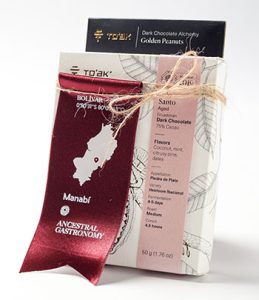
Chocolate TO'AK
Product Name:
To’ak Chocolate
Location:
Origin: Piedra de Plata Manabí – Ecuador
Product Description
Salprieta Alchemy Grande
- Content: 56 g (4 bars of 14 g each)
- Ingredients: 65% dark chocolate (ancestral national cacao, cane sugar), peanuts, salprieta (peanuts, achiote, cilantro, sea salt, and ground ancestral corn), achiote paste, cilantro, cocoa butter.
- Origin: Manabí Province, Ecuador.
- Description: This bar pays tribute to salprieta, an ancestral preparation from the Ecuadorian coast that combines peanuts with spices such as achiote and cilantro. To’ak elevates it by blending it with their high-quality dark chocolate, creating a unique sensory experience that celebrates Ecuadorian gastronomy.
Signature Palo Santo Aged
- Content: 50 g
- Ingredients: 75% cacao, cane sugar.
- Description: This limited edition of To’ak stands out for its aging process with Palo Santo wood, an emblematic tree of the Ecuadorian coast. The result is a chocolate with aromatic notes of coconut, mint, citrus pine, and prunes, offering a deep and complex sensory experience.
Ancestrality of the product
Salprieta Alchemy Grande
The product Salprieta Alchemy Grande is deeply inspired by an ancestral practice from the Ecuadorian coast, specifically from the communities that have inhabited the region since pre-Columbian times. Salprieta is a traditional recipe that combines peanuts with a mix of native spices such as achiote, cilantro, sea salt, and ancestral corn. This dish, passed down through generations, reflects the rich cultural heritage of the region’s indigenous peoples.
- Inspiration and Ancestral Technique: The technique of mixing peanuts with spices and sea salt is traditionally used in coastal cuisine. The use of achiote, for example, is characteristic of the area, as this plant has been cultivated by various ancestral cultures for its ability to color and flavor food, as well as its medicinal properties.
- Protection of Ancestral Knowledge: By incorporating this ancestral recipe into a high-end product like Salprieta Alchemy Grande, To’ak not only offers a unique culinary experience but also honors and preserves this tradition. The goal is to keep ancestral knowledge alive by valuing native ingredients, while simultaneously introducing these ancestral flavors to a global audience, helping to protect them from extinction.
Signature Palo Santo Aged
The Signature Palo Santo Aged is a product that pays homage to another ancestral knowledge of Ecuador: the use of Palo Santo, a sacred wood used by indigenous cultures in the Andean region for spiritual and healing rituals.
- Inspiration and Ancestral Technique: The use of Palo Santo to flavor and cure is not just a technique but a way to honor the spiritual ties with nature. The process of aging cacao with Palo Santo is an innovative technique by To’ak, but the use of this wood in rituals and ceremonies has centuries of history in indigenous communities.
- Crafting Methods: The Signature Palo Santo Aged chocolate is made through a process of aging cacao with Palo Santo wood, which imparts a unique flavor and aroma to the chocolate. This method reflects the ancestral tradition of respectful interaction with nature, where natural ingredients are carefully treated to allow their essence to be transmitted deeply into the products.
- Protection of Ancestral Knowledge: By incorporating Palo Santo into this chocolate, To’ak not only uses a special ingredient but also preserves an ancestral practice. This action helps protect and promote indigenous knowledge of Palo Santo use in the modern world, giving recognition to its cultural value.
PRODUCT IMPORTANCE:
We have a strong commitment to environmental conservation and respect for local communities through our sustainability project. We promote the conservation of Ecuadorian Nacional cacao and biodiversity by growing cacao in secondary forests and adopting responsible farming practices, such as minimal water use and the absence of pesticides. Additionally, we help protect wilderness areas by using agroforestry methods to preserve ecosystems.
As for the communities, To’ak directly supports cacao farmers, ensuring fair compensation and promoting sustainable practices.
The use of native ingredients such as Palo Santo and achiote not only enriches the chocolate but also preserves the ancestral traditions of indigenous and Afro-Ecuadorian communities. To’ak acts as a global ambassador for Ecuadorian cacao, raising awareness worldwide about the importance of conservation and social justice.
“We don’t just create high-quality premium chocolate, we also promote a responsible business model that honors the environment, local cultures, and ancestral traditions, demonstrating that it is possible to offer luxury without compromising sustainability or social equity.”
Target Audience
To’ak offers an exceptional sensory experience while supporting cultural and environmental conservation. The target market is primarily in international markets such as the U.S., Canada, the U.K., and Japan, although there are also local consumers in Ecuador interested in exclusive products.
Social ans Environmental Responsibility
To’ak Chocolate is committed to social and environmental responsibility through various sustainable practices:
Eco-friendly materials: Uses recyclable packaging and minimizes the use of single-use plastics.
Manufacturing process: Implements agroforestry to grow cacao alongside other trees, reducing deforestation and promoting biodiversity. Additionally, it seeks efficiency in water use and renewable energy in its production.
Social benefits: Works with local farmers, ensuring fair compensation and promoting fair trade. It also supports vulnerable groups and generates local employment.
Sustainability actions: Supports reforestation projects and trains farmers to improve their agricultural practices sustainably.
Phone
02-322-7520
Website / Social Media
www.toakchocolate.com
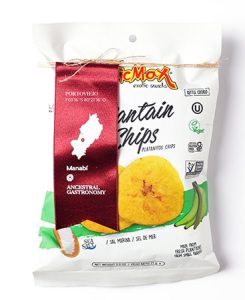
Plantain Republic
PRODUCT NAME
TropicMax Plantain Snacks
LOCATION:
Calle 15 de Abril y Tulipanes Portoviejo, Manabí, Ecuador
Authentic ancestral flavor from Manabí to the world
Plantain chips, known internationally as “chifles,” are a symbol of Latin American cuisine, originating on the Ecuadorian and Peruvian coasts. In Manabí, the birthplace of our company TropicMax, this snack is part of daily life. Made from green plantains harvested year-round, our chifles preserve traditional methods passed down through generations. At Plantain Republic S.A., we are committed to delivering an artisanal product full of history and flavor that brings together cultures, families, and unforgettable moments.
A nutritious, natural alternative to conventional snacks
Unlike industrial snacks made from potatoes or processed ingredients, our chifles are a healthy option—free of artificial additives and excessive fats. Rich in potassium and fiber, plantains offer daily dietary benefits. With year-round availability, we ensure a fresh and sustainable product. TropicMax stands as a symbol of natural goodness, perfect for those seeking balance and flavor.
Connecting global palates with Latin American roots
Our snacks know no borders. TropicMax has reached over 30 countries, delighting Hispanic, Jamaican, North American, and European communities. Loved by all ages, our chifles are a culinary bridge linking Ecuadorian traditions with global tastes. Now featured in major international chains, our products are recognized for authenticity, flavor, and identity.
Committed to the environment and our people
At Plantain Republic S.A., social and environmental responsibility is a cornerstone. We repurpose banana peels as cattle feed, supporting a circular economy. Proceeds fund charitable initiatives like the Father Matías Mujica Foundation and the Senior Citizens Foundation. We proudly employ heads of households, people with disabilities, and foreign talent—creating real opportunities in our community. Choosing TropicMax means choosing a product with purpose.
Product Description
Currently Available:
- Plantain Chips – Salted (72 units x 28g)
- Plantain Chips – Ripe (72 units x 28g)
- Plantain Chips – Garlic (72 units x 28g)
- Plantain Chips – Salted (24 units x 57g)
- Plantain Chips – Ripe (24 units x 57g)
- Plantain Chips – Ripe with Salt (24 units x 57g)
- Plantain Chips – Garlic (24 units x 57g)
- Plantain Chips – Spicy (24 units x 57g)
- Plantain Chips – Lemon (24 units x 57g)
- Plantain Chips – Salted, Family Size (12 units x 255g)
- Plantain Chips – Ripe, Family Size (12 units x 255g)
- Plantain Chips – Spicy, Family Size (12 units x 255g)
- Plantain Chips – Salted, Club Size (12 units x 425g)
- Plantain Chips – Ripe, Club Size (12 units x 425g)
- Plantain Chips – Six Pack (12 packs: 3 salted, 2 ripe, 1 garlic – 1 oz each)
- Tostones – Salted (72 units x 28g)
- Tostones – Ripe (72 units x 28g)
- Tostones – Salted (24 units x 40g)
- Tostones – Ripe (24 units x 40g)
- Tostones – Garlic (24 units x 40g)
- Tostones – Spicy (24 units x 40g)
- Tostones – Lemon (24 units x 40g)
- Tostones – Salted, Family Size (12 units x 170g)
- Tostones – Ripe, Family Size (12 units x 170g)
- Tostones – Garlic, Family Size (12 units x 170g)
- Tostones – Spicy, Family Size (12 units x 170g)
- Salted Plantain Strips (12 units x 213g)
- Ripe Plantain Strips (12 units x 213g)
- Salted Plantain Strips (24 units x 64g)
- Ripe Plantain Strips (24 units x 57g)
- Organic Plantain Chips – Salted (12 units x 142g)
- Organic Plantain Chips – Ripe (12 units x 142g)
- Organic Plantain Chips – Salted (12 units x 567g)
- Organic Plantain Chips – Ripe (12 units x 567g)
- Salted Plantain Chips – Plastic Jar (6 units x 567g)
- Ripe Plantain Chips – Plastic Jar (6 units x 567g)
- Plantain Croutons – Salted (12 units x 142g)
- Plantain Croutons – Garlic (12 units x 142g)
- Plantain Croutons – Spicy (12 units x 142g)
- Veggie Snacks
- (Includes orange sweet potato, purple sweet potato, cassava, and white carrot)
- Veggie Snacks (24 units x 57g)
Ancestrality of the product
Chifles, or plantain chips, are a traditional food of several Latin American regions. Originating on the Ecuadorian and Peruvian coasts, pre-Hispanic cultures consumed green plantains as part of their daily diets. In Manabí, chifles are a staple, and methods for making tostones (twice-fried smashed plantain slices) have been passed down for generations. Plantain Republic honors this heritage by crafting artisanal snacks that unite cultures and communities.
Product Importance
Made from year-round harvested plantains, chifles offer a continuous, nutritious supply—unlike conventional potato snacks that are often deep-fried and less healthy.
Target Audience
Our snacks appeal to all age groups—children, youth, adults, and seniors—and are widely accepted in over 30 countries. Beyond Hispanic communities, they’re also loved by Jamaicans, Americans, and Europeans, and featured in top global retail chains.
Social ans Environmental Responsibility
We prioritize environmental care, support circular economies by donating plantain peel waste for cattle feed, and use profits for community aid. We employ heads of households, people with disabilities (in compliance with Ecuadorian law), and international talent.
Phone
593 98 337 5342
Email
Website / Social Media
https://www.tropicmax.com/
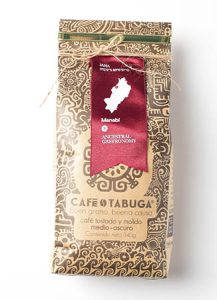
Cafe Tabuga
PRODUCT NAME:
Café Tabuga.
LOCATION:
Tabuga Community, Jama, Manabí.
Café Tabuga: Where great coffee is born from the forest and culture
In the beautiful community of Tabuga, Jama (Manabí), a coffee is born that is much more than a beverage—it is a bridge between nature, ancestral history, and social commitment. Grown in agroforestry systems that regenerate the forest and protect the soil, Café Tabuga is an artisanal blend of Arabica varieties (Sarchimor, Acawá, Arará, and Catucaí) processed using Honey and Natural methods. It delights the senses with notes of dark chocolate, yellow fruits, a creamy body, and medium-high acidity. Every bean represents the dedication of a community that believes in the power of its roots and in a sustainable future.
Ancestral roots, flavor that transcends generations
Inspired by the Jama Coaque culture (500 BC to 500 AD)—one of the most iconic civilizations of the Ecuadorian coast—Café Tabuga honors Manabí’s agricultural and communal legacy. From selective harvesting to artisanal sun-drying, every stage uses techniques passed down through generations. Women and youth play a key role in preserving this knowledge, strengthening local identity and empowering new leaders. The fully biodegradable packaging incorporates ancestral symbolism, turning each 340g bag into a piece of art, history, and environmental commitment.
Certification, trust, and global awareness
Café Tabuga follows certified organic production and traceability standards, ensuring transparency, food safety, and responsibility in every cup. We comply with fair trade and sustainability standards and are pursuing international quality seals. Partnerships with local and international organizations support technical development and open conscious export pathways—connecting the world with a coffee that has purpose.
A coffee with soul, for intentional consumers
Our target audience seeks more than exquisite flavor—they seek meaning. From major Ecuadorian cities to niche international markets, Café Tabuga is for consumers who value products with history, social impact, and transparency. We also appeal to specialty coffee lovers who appreciate our Full City roast and the unique sensory experience it offers. Café Tabuga doesn’t just grow coffee—it cultivates community, dignity, and a new regenerative rural development model.
Product Description
Café Tabuga is a locally and cooperatively grown product, produced with ecological practices in agroforestry systems. It contributes to the conservation of the northern Manabí coastal forest. We process a blend of Sarchimor, Acawá, Arará, and Catucaí beans—all Arabica varieties—with Honey and Natural processes. Our Full City roast highlights notes of dark chocolate and yellow fruits, with a creamy body and medium-high acidity. Packaged in 100% biodegradable materials with Jama Coaque-inspired designs.
Ancestrality of the product
Café Tabuga draws deeply from Manabí’s ancestral identity, blending traditional knowledge and sustainable farming. Inspired by the Jama Coaque culture, each step from harvesting to drying in handmade drying houses carries generations of wisdom. Local women are central to preserving these traditions, and young people engage in barista training, ensuring continuity. The packaging design preserves symbolic elements of the culture and reflects a social and cultural commitment: “Good Bean, Good Cause.”
Target Audience
Core segment:
Age: 25–45 years
Urban areas in Ecuador (Quito, Guayaquil, Manta) and niche international markets
Lifestyle: Ethical, ecological, culturally engaged
Interests: Healthy living, organic food, fair trade, responsible tourism
Socioeconomic: Middle-upper to high, willing to pay more for purpose-driven products
Digital behavior: Active on Instagram/Facebook, follow conscious brands
Secondary segment:
Specialty coffee lovers of all ages
Appreciate flavor notes, origin, and craftsmanship
Social ans Environmental Responsibility
Environmental Commitment:
Agroforestry production to enhance biodiversity and soil
Shadow-grown coffee
10-year Zero Waste plan: biodigesters, composting, water reuse, recycling
Local development of organic inputs
Social Responsibility:
Inclusive model with 8-community co-op (AGROTABUGA)
Local fair trade—no middlemen
Training in organic management, post-harvest, roasting
Community school and ecotourism education
Product Importance
This is not just coffee—it’s a sensory and ethical experience. It connects consumers to origin, sustainability, and social impact. Grown in forest-based systems with organic practices, Café Tabuga unites quality with environmental and social consciousness.
Email
Website / Social Media
Instagram: @cafetabuga https://www.facebook.com/cafetabuga
Facebook: @cafetabuga https://www.instagram.com/cafetabuga/?igsh=MWduenlwMnBwZG50NA%3D%3D#
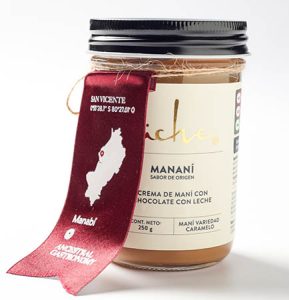
Mananí
PRODUCT NAME:
Mananí – peanut and chocolate spread (2 versions: Charapotó peanut with dark chocolate, caramelized peanut with milk chocolate)
LOCATION:
San Vicente, Manabí – km 4 on the San Isidro road
Mananí: tradition you can spread, history you can taste
From the fertile lands of San Vicente, Manabí, comes Mananí—a peanut and chocolate spread that blends the soul of tradition with artisanal innovation. Made with local peanuts from Charapotó and fine-origin chocolate, this Manabí delicacy comes in two irresistible versions: caramelized peanut with milk chocolate and classic peanut with dark chocolate. Each jar tells a story that honors the agricultural legacy of our communities, the wisdom of our elders, and the flavor that defines our region. It’s more than a spread—it’s identity in a jar.
Ancestral knowledge, flavors that connect
Peanuts and cacao are not new to our tables. These are ancient seeds, cultivated with reverence and passed down through generations as sacred staples of ancestral cuisine. Mananí continues this lineage with an artisanal process that respects nature’s rhythms and enhances ingredients through an 8-hour conching process, as traditional chocolate-making demands. The result is a soft, deep texture filled with nuance—a flavor that evokes Manabí’s collective memory and speaks to those who value the authentic and eternal.
For a conscious consumer
Mananí is crafted for those who seek more than just a product—they seek purpose. Young adults and grownups who care about what they eat, who choose intentionally, and who value organic, fair-trade goods with cultural roots and social impact. These consumers are interested in the stories behind their food. Mananí connects them to the land and the rural communities of Manabí through an ethical process that prioritizes values over mass production. It’s a gourmet product that nourishes both body and spirit.
Committed to the land and its people
Each jar of Mananí is a commitment to local development. It generates fair employment, supports regenerative farming, promotes agroecological practices, and funds projects like the Iche School. Families growing peanuts and cacao receive not just fair pay—they become part of a network that honors their work, traditions, and future. Mananí is nourishment, but it is also a cause, a culture, and a community. It is the taste of a Manabí that grows without forgetting its roots.
Product Description
Mananí is a locally produced peanut cream made with selected organic chocolate through an 8-hour conching process using selected local peanut varieties. It is used as a spread on toast, bread, fruit, pancakes, or as a sauce for desserts and ice cream.
Ancestrality of the product
Peanuts are a treasure of pre-Columbian agri-food heritage, cultivated for generations for their nutrition and vitality. In Manabí, peanuts are not just food—they’re symbols of abundance and key to the region’s culinary identity, used in everything from appetizers to desserts. This legacy lives on through traditional techniques and the collective memory of Manabí’s communities.
Cacao, too, has deep ancestral roots in Ecuador and Manabí. Indigenous cultures like the Mayo-Chinchipe—and later coastal and Amazonian peoples—cultivated cacao long before colonization, using it for ritual, medicine, and trade. Manabí’s favorable climate and generational knowledge make it a hub for fine cacao varieties like Nacional. Modern artisanal processes now honor this rich legacy.
Product Importance
Mananí fuses two essential Manabí ingredients—peanuts and cacao—both cherished for generations. Combining these in an artisanal spread preserves traditional chocolate-making techniques like conching, while honoring the ancestral wisdom of the region’s ingredients. It’s not just a delicious product—it’s a cultural reconnection.
Target Audience
Primarily young and adult consumers (ages 25–45) of all genders, who value healthy, high-quality, culturally rooted gourmet products. This includes urban professionals and families with a preference for authentic, organic, and ethically made foods.
They value conscious eating and prefer natural, sustainable, and culturally respectful products. Their interests include healthy living, sustainability, and knowing the origin of their food.
Geographically, the product is marketed in urban Ecuadorian areas like Quito, Guayaquil, and Cuenca, with strong potential for export to markets like the U.S. and Spain, where there is growing demand for ethnic, organic, and artisanal products with social impact.
Social ans Environmental Responsibility
Mananí’s production is fully artisanal, using fewer resources than mass industrial processes. Its traditional methods reduce environmental impact, and its supply chain supports local farmers and fair-trade cooperatives. It promotes regenerative agriculture and community initiatives like Iche School, enhancing regional cohesion and sustainability.
Phone
593 95 969 9262
Email
Website / Social Media
Instagram: @icherestaurante https://www.facebook.com/icherestaurante
Facebook: @icherestaurante https://www.instagram.com/icherestaurante?igsh=N2NycWdwcmd1d25r
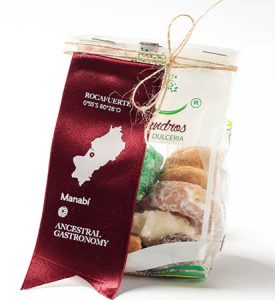
Dulcería Los Almendros
PRODUCT NAME:
Dulcería los Almendros
LOCATION:
Rocafuerte, Manabí
A story of heritage, flavor, and tradition
Founded 26 years ago in the heart of Rocafuerte, Dulcería Los Almendros is a family-run business preserving the ancestral art of candy-making. Its owner, Hondina Delgado Vélez, inherited from her mother the gift of transforming countryside ingredients into authentic flavor treasures.
The origins of these sweets date back to the 19th century, when nuns arrived in town and began making alfajores to support the poor. Since then, Rocafuerte has become the cradle of traditional candy makers and is now known for its more than 300 varieties of handmade sweets.
Artisanry in every bite
The dulcería uses fresh farm-sourced ingredients: milk, eggs, sweet potatoes, pineapple, coconut, bananas—blended with sugar, flour, starch, and lots of love. Everything is 100% handmade, chemical- and preservative-free, using traditional methods such as wood-fired stoves. Some recipes also use industrial kitchen equipment while keeping their homemade essence. Customer favorites include:
- Alfajores (chocolate, cornstarch, banana, almond varieties)
- “Huevos moyos” (also known as “faldiqueros”)
- Meringues
- Starch cookies
- Troliches
- Assorted coconut sweets
Commitment to quality and safety
All products are registered with Ecuador’s sanitary authorities, ensuring food safety. The dulcería maintains strict hygiene and quality standards throughout its production.
Affordable prices for every palate
Starting at just US$0.08, these traditional treats bring sweetness and heritage to everyone—from curious samplers to the most refined palates.
A flavor that transcends borders
Dulcería Los Almendros has delighted palates beyond Ecuador, carrying Manabí’s sweetness to other countries and establishing Rocafuerte as a cultural and culinary destination recognized for its traditional candies.
Speaking of these sweets is to speak of identity, history, innovation, and love for one’s roots. They are part of the collective memory of a people who, through sugar, patience, and creativity, continue sharing sweetness with the world.
Product Description
Our products are 100% handmade with no chemicals or preservatives. They are made from ingredients sourced directly from local farms—milk, fruits, eggs—as well as commercial staples like flour, sugar, cinnamon, and starch. We offer products in biodegradable bags and tubs. With more than 300 varieties, customer favorites include:
- Chocolate, cornstarch, almond, and banana alfajores
- Traditional “huevos moyos” or “faldiqueros”
- Meringues
- Starch cookies
- Troliches
- Coconut sweets in various flavors
These treats are beloved by all and offered at very accessible prices starting at US$0.08.
Ancestrality of the product
Dulcería Los Almendros was born in Rocafuerte, Manabí’s sweetest canton, 26 years ago. Founder Hondina Delgado Vélez inherited the craft from her mother. Legend has it that in the 19th century, nuns in Rocafuerte began making sweets—especially alfajores—to help the needy. This marked the beginning of a long-standing local tradition.
Target Audience
The products are aimed at lovers of traditional cuisine—people who value handmade, natural, and heritage-based flavors. They also appeal to nostalgic consumers who associate artisanal sweets with childhood memories, holidays, and special family moments. Additionally, national and international tourists seeking to connect with the region’s cultural identity through its cuisine find these sweets especially attractive.
Social ans Environmental Responsibility
We are registered with health authorities, a factor that has allowed us to export and reach international markets. Our focus on artisanal methods and natural ingredients supports sustainable, culturally rooted gastronomy.
Product Importance
The key value lies in freshness: the sweets are made daily, without preservatives. Traditional cooking methods like wood-fired stoves are still used, preserving authentic flavors.
Email
Phone
099719839
Website / Social Media
Facebook: Dulcería Los Almendros https://www.facebook.com/LosAlmendrosDulceria
Instagram: Dulcería Los Almendros:
https://www.instagram.com/dulcerialosalmendros/?igsh=bWltaTlsZWZ4emE1#
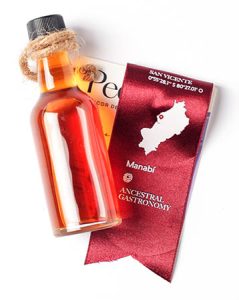
Licor de pechiche
PRODUCT NAME:
Pechiche Liqueur
LOCATION:
San Vicente – Manabí, km 4 de la vía a San Isidro. https://g.co/kgs/ystfg13
Product Description
- Pechiche liqueur is made from sugarcane liquor—known locally in Manabí as currincho—distilled twice to obtain a pure and balanced base. This is macerated with locally produced pechiche fruit and then aged in oak barrels, adding complexity and depth to the flavor. Inspired by the traditional Manabí mistela, we have developed a formula with a lower sugar content to highlight the unique and fragrant flavor of pechiche as the true protagonist. The result is a versatile liqueur, ideal for use in desserts, sauces, marinades for meat or fish, or simply enjoyed as an exquisite digestive. Its fruity, sweet, and aromatic profile, combined with delicate wood notes, is reminiscent of the elegant nuances of sherry or port.
Ancestrality of the product
- Is the product inspired by traditional techniques, recipes, materials, or knowledge?
This liqueur is inspired by traditional recipes for mistela and dulce de pechiche, celebrating the culinary heritage of Manabí. Its main ingredient, the fruit of the pechiche tree (Vitex cymosa), native to South America and currently endangered, is a symbol of biodiversity and local identity. By revaluing this ancestral fruit, the product not only preserves a tradition but also promotes its cultivation and planting, thus contributing to the protection of a unique ecosystem and the rescue of knowledge that is part of Manabí’s cultural heritage.
- With which community, people, or ancestral culture is it associated?
Pechiche (Vitex cymosa) grows wild in the coastal provinces of Guayas, El Oro, Manabí, and Los Ríos, in western Ecuador. This fruit is part of the landscape and culinary tradition of these areas, especially in Manabí, where the sweet alcoholic mistela de pechiche has been a staple at local celebrations and festivities for generations.
- Are there any inherited or generational production methods used?
Traditional maceration, fermentation, and aging techniques passed down from generation to generation are used to make pechiche liqueur, following the legacy of Manabí artisanal beverages such as mistelas, macerados, and quemados.
- What cultural or symbolic elements are preserved in the product?
Pechiche liqueur revives ancestral practices and knowledge linked to the Manabí identity. It preserves the tradition of making homemade drinks to share with family and community, especially in festive settings. These drinks not only have culinary value but also symbolic value, representing hospitality, memory, and a connection to the land.
- How is this ancestral knowledge honored or protected through the product?
Through this liqueur, we pay homage to the oral and culinary tradition of Manabí, highlighting both the value of pechiche and the knowledge of those who have kept the practice of preparing mistelas and macerados alive. During the tasting, we share the history of the fruit, the tree, and the beverage, raising awareness about their cultural and ecological importance and encouraging the planting of pechiche trees as a way to preserve this living legacy.
Product Importance
Pechiche Iche Liqueur is a contemporary reinterpretation of the traditional Manabí mistela, made with inherited methods that honor the ancestral knowledge of our region. Made from a double-distilled sugarcane liquor macerated with local pechiche fruit, this artisanal liqueur is aged in oak barrels to achieve a complex, fragrant, and elegant sensory profile, with sweet, fruity notes and hints of wood reminiscent of wines such as sherry or port.
Its low-sugar formula enhances the unique flavor of pechiche (Vitex cymosa), a fruit native to the Ecuadorian coast and an essential part of Manabí’s gastronomy and collective memory. By placing pechiche as the protagonist, this liqueur contributes to its cultural appreciation and to the conservation of the tree that produces it, currently at risk of extinction.
More than a beverage, Pechiche Liqueur is a liquid tribute to our Manabí identity. Its versatility allows it to be enjoyed as a digestive or as an ingredient in desserts, sauces, or marinades, thus connecting the past with the cuisines of the present.
With each bottle, we share a story of land, knowledge, and flavor.
Target Audience
Pechiche Iche Liqueur is aimed at an adult audience, between 30 and 65 years old, men and women, with a middle to upper-middle socioeconomic status, with an affinity for artisanal, gourmet, and locally sourced products. It includes professionals and entrepreneurs, travelers, food lovers, and consumers with a conscious lifestyle connected to culture, sustainability, and local products.
This group values products with history, authenticity, and quality, seeks memorable gastronomic experiences, and is willing to pay for products that represent artisanal work and a sense of belonging. They enjoy fine spirits and wines, often consume limited-edition products, and seek unique options to give as gifts or to celebrate special moments.
The product can also attract tourists (national and international) who visit Manabí in search of authentic cultural and gastronomic experiences, as well as specialty stores, boutique hotels, and high-end restaurants that prioritize products with identity.
Geographically, the market is primarily concentrated locally (Manabí and other provinces along the Ecuadorian coast), with potential for expansion into the national market (Quito, Guayaquil, Cuenca) and, in the medium term, the international market, particularly in countries where there is interest in Latin American products with history and sustainability.
This audience is ideal for the product because they are looking not just for a liqueur, but for a story, a connection to culture, and a symbol of tradition transformed into a contemporary experience. Pechiche Iche Liqueur responds to this desire for meaningful consumption.
Social ans Environmental Responsibility
Pechiche Iche Liqueur is produced with a focus on social responsibility, promoting practices that foster local development, fair trade, and biodiversity conservation. Although it currently has no environmental or social certifications, the product incorporates specific actions aimed at sustainability:
- Educational production with social impact: It is part of the Iche Innovation Lab, where students and young people from the area receive training in gastronomy, production processes, and innovation. Through liqueur production, they acquire knowledge and practical skills that strengthen their employability and entrepreneurial abilities.
- Direct purchase from local producers: Pechiche fruit is purchased directly from local producers, without intermediaries, guaranteeing a fair price and promoting traditional agricultural practices without the use of chemicals.
- Training for responsible harvesting: Technical support is provided to harvesters to ensure proper harvesting of the pechiche, which allows for the conservation of the tree and guarantees its natural regeneration.
- Biodiversity conservation: By revaluing the pechiche as the main ingredient in the liqueur, the planting and protection of this native tree, currently at risk of extinction, is encouraged. This tree is part of the ecosystem of the second smallest hummingbird in the world, so its rescue contributes to maintaining the ecological balance of the region.
The product is committed to continuing to strengthen its sustainable and socially responsible approach, as part of the Iche Center’s comprehensive vision.
Phone Number
+593 95 969 9262
Email
Website / Social Media
Comité Promotor de Manabí una Gastronomía Milenaria
Eco. Leonardo Orlando Arteaga
Puesto: Prefecto de Manabí
Institución: Gobierno Provincial de Manabí
Email: jorlando@manabi.gob.ec
Ing. Luis Villacreses Sierra
Puesto: Presidente
Institución: Cámara de Industrias y Producción De Manabí
Email: presidencia@industriasmanabi.com
Dr. Marcos Zambrano Zambrano
Puesto: Rector
Institución Académica: Universidad Laica Eloy Alfaro De Manabí-ULEAM
Email: marcos.zambrano@uleam.edu.ec
MPA Orazio Bellettini Cedeño:
Puesto: Director Ejecutivo,
ONG: Fundación para los Emprendimientos Gastronómicos y las Oportunidades Sostenibles – Fuegos:
Email: info@fuegos.ec –
Tour Operadores del Turismo de Aventura y Naturaleza del Destino Gastronómico Manabí
HOLA AVENTURA
Ubicación-Manta
Teléfono- +593 969694712
Página Web-
Email turismo@holaventura.com
AGENCIA DE VIAJES KV TRAVEL
Ubicación- Manta
Teléfono- +593 986567831
Página Web-
Email- kvtravel@hotmail.com
REEF NATURAL TOUR
Ubicación- Manta
Teléfono- +593 999057235
Página Web- ww.reefnaturaltour.com
Email- imrsolucionesec@gmail.com
SGTOUR
Ubicación- Manta
Teléfono- +593 981593100
Página Web-
Email- financierocentro@sgtour.com.ec
AEROPORTO
Ubicación-Portoviejo
Teléfono- +593 52635914
Página Web-
Email- aeroportopvo@gmail.com
ECUADOR CEIBOSTOUR
Ubicación-Portoviejo
Teléfono- +593 989893101
Página Web- https://www.ceibostour.com
Email- ecuadorceibostour@gmail.com
PALO SANTO TRAVEL
Ubicación-Pto. López
Teléfono- +593 995464280
Página Web-
ww.whalewatching-ecuador.com
Email- palosantotravel22@gmail.com
NATURIS TOURS
Ubicación- Pto. López
Teléfono- +593 984951841
Página Web-
www.naturis.com.ec
Email- info@naturis.com.ec
AMAZING ADVENTURE TRAVEL
Ubicación- Pto. López
Teléfono- +593 969694712
Página Web- www.aventuraslaplata.com
Email- info@aventuraslaplata.com
